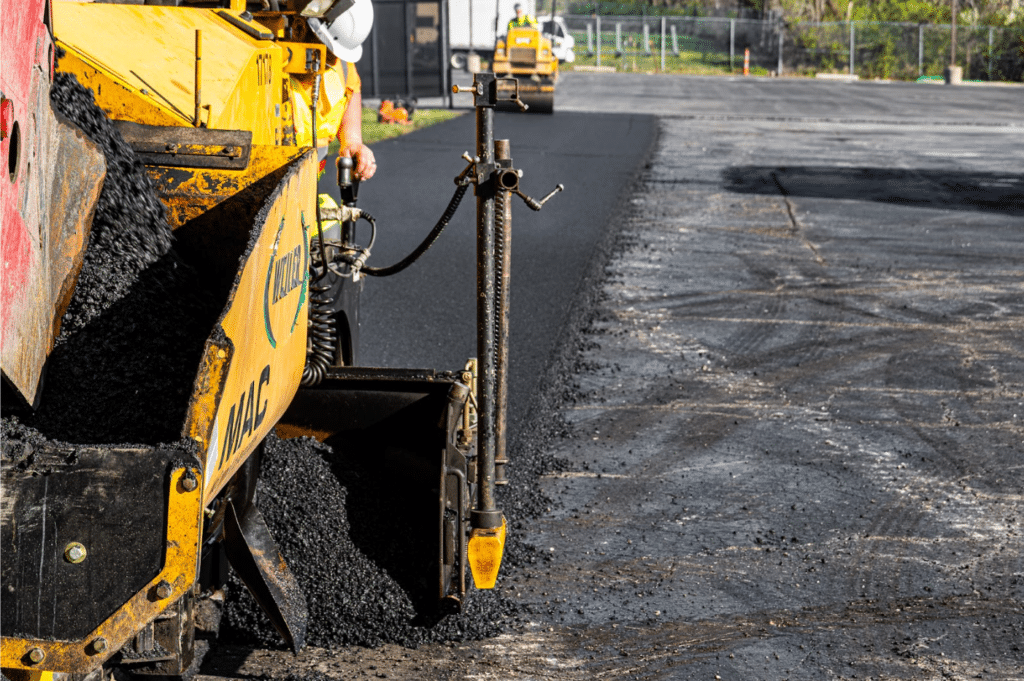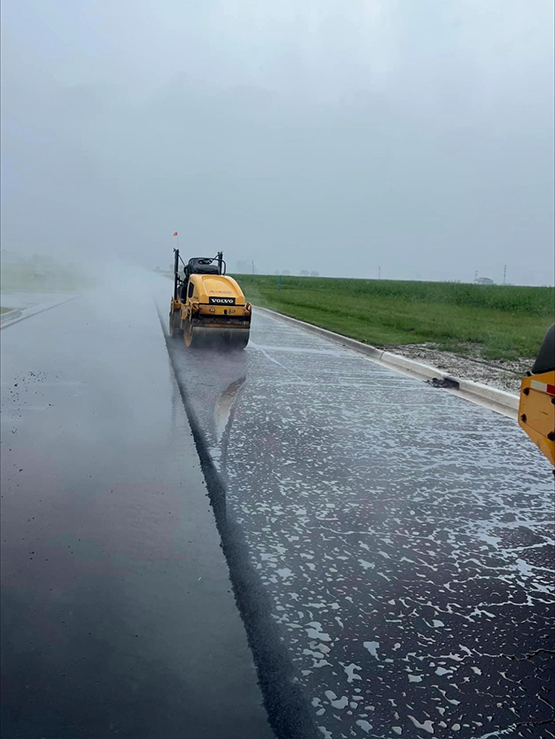Understanding the Different Kinds of Asphalt Paving Available Today
In the world of construction and facilities, an extensive understanding of the various types of asphalt paving is crucial for ideal task outcomes. From the robust Hot Mix Asphalt, created for high-traffic areas, to the ecologically aware Porous Asphalt that helps with water administration, each type offers distinct advantages customized to details requirements.

Hot Mix Asphalt
What makes hot mix asphalt a recommended choice for roadway building and construction and fixings? Hot mix asphalt (HMA) is preferred for its durability, versatility, and efficiency under varying problems.
HMA's capacity to be customized to certain task requirements is an additional significant benefit. Various gradations and formulas can be utilized to enhance residential or commercial properties such as versatility, resistance to deformation, and durability. Additionally, warm mix asphalt can be quickly mounted and available to web traffic, lessening interruption throughout construction.
Ecological considerations also play a role in the preference for HMA. The material is recyclable, and recovered asphalt pavement (RAP) can be reused, promoting sustainability in roadway building practices. In general, warm mix asphalt stands out as a reliable choice, efficiently providing a long-lasting, high-performance surface that meets the needs of contemporary facilities.
Cold Mix Asphalt
Cold mix asphalt is a flexible alternative to warm mix asphalt, specifically matched for particular applications such as patching and surface area therapies. This kind of asphalt is produced at ambient temperature levels, enabling much easier handling and application without the need for considerable heating tools.
Normally composed of asphalt solutions or lowerings, chilly mix asphalt can be blended on-site or acquired pre-mixed. Its properties enable it to bind well with existing pavement, making it an efficient service for fixing pits, splits, and various other surface problems. In addition, it can be applied in a range of climate condition, providing a useful option for year-round upkeep.

Nonetheless, while cool mix asphalt is ideal for short-lived fixes, it may not provide the very same longevity or toughness as warm mix asphalt under heavy web traffic problems. It is finest made use of for low-traffic locations or as a short-term service till even more irreversible repairs can be performed.
Cozy Mix Asphalt
While hot mix asphalt has actually long been the requirement for roadway building, warm mix asphalt (WMA) has actually become an ingenious alternative that balances efficiency with ecological considerations. WMA is generated at dramatically lower temperature levels-- commonly in between 215 ° F and 275 ° F-- contrasted to hot mix asphalt, which is warmed to around 300 ° F. This reduction in temperature level not only decreases energy intake but also reduces greenhouse gas discharges during production.
The technology behind WMA includes using additives or methods that make it possible for better workability find this at lower temperatures. These can include chemical ingredients, frothing processes, or a combination of both. Consequently, WMA keeps the necessary residential properties for longevity and performance while offering a more eco-friendly option.

Porous Asphalt
Permeable asphalt stands for a forward-thinking approach in pavement layout, focusing on both performance and ecological sustainability. This cutting-edge product is especially crafted to allow water to penetrate with its surface, successfully minimizing overflow and advertising groundwater recharge. Therefore, porous asphalt is an exceptional choice for locations Homepage vulnerable to flooding or where stormwater administration is important.
The make-up of permeable asphalt varies from typical asphalt, featuring a higher percentage of voids that help with drain. This property not only minimizes surface area water buildup but additionally assists mitigate issues like hydroplaning and improves automobile grip during wet conditions. asphalt paving acworth ga. Additionally, porous asphalt can add to urban warmth island reduction, as it permits higher evaporation and cooling impacts in city settings
In terms of installment, permeable asphalt requires cautious factor to consider of underlying drain systems to guarantee optimum efficiency. Maintenance commonly includes regular inspections and cleansing to avoid obstructing from debris, which can harm its permeability. Overall, porous asphalt functions as a lasting paving remedy that aligns with contemporary environmental objectives, making it an increasingly preferred selection for both public and exclusive projects.
Rubberized Asphalt
Rubberized asphalt is an innovative paving material that integrates recycled rubber, normally sourced from scrap tires, into the asphalt mix. This ingenious strategy not just boosts the performance of typical asphalt yet likewise promotes ecological sustainability by recycling waste materials. The enhancement of rubber boosts the adaptability and longevity of the sidewalk, making it immune to fracturing and contortion under differing temperature conditions.
One of the significant benefits of rubberized asphalt is its capacity to lower sound pollution. The rubber particles take in sound, leading to quieter highways, which is particularly helpful in urban locations. This kind of asphalt supplies boosted skid resistance, boosting security for cars.
Rubberized asphalt additionally adds to prolonging the life expectancy of road surfaces, leading to lowered maintenance prices with time. This long life is especially beneficial for high-traffic locations where wear and tear are accelerated. In addition, its resistance to moisture infiltration helps decrease the danger of water damages, further enhancing durability.
Verdict
In summary, the range of asphalt paving types-- Hot Mix Asphalt, Cold Mix Asphalt, Cozy Mix Asphalt, Porous Asphalt, and Rubberized Asphalt-- each satisfy distinct functions that deal with varied building and construction and upkeep requirements. These alternatives not visit site just improve road quality but also add to sustainability through lowered energy intake and improved water administration. Comprehending these differences is important for picking the appropriate asphalt kind, ultimately making sure efficient and effective paving options in numerous settings.
From the robust Hot Mix Asphalt, made for high-traffic areas, to the eco aware Porous Asphalt that promotes water administration, each type presents distinct advantages tailored to certain demands.Normally made up of asphalt emulsions or lessenings, cold mix asphalt can be mixed on-site or bought pre-mixed.While hot mix asphalt has actually long been the criterion for roadway building, cozy mix asphalt (WMA) has arised as a cutting-edge alternative that stabilizes performance with ecological considerations.Rubberized asphalt is an innovative paving product that integrates recycled rubber, usually sourced from scrap tires, right into the asphalt mix.In summary, the range of asphalt paving kinds-- Warm Mix Asphalt, Cold Mix Asphalt, Cozy Mix Asphalt, Porous Asphalt, and Rubberized Asphalt-- each accomplish distinct functions that cater to diverse construction and upkeep requirements.